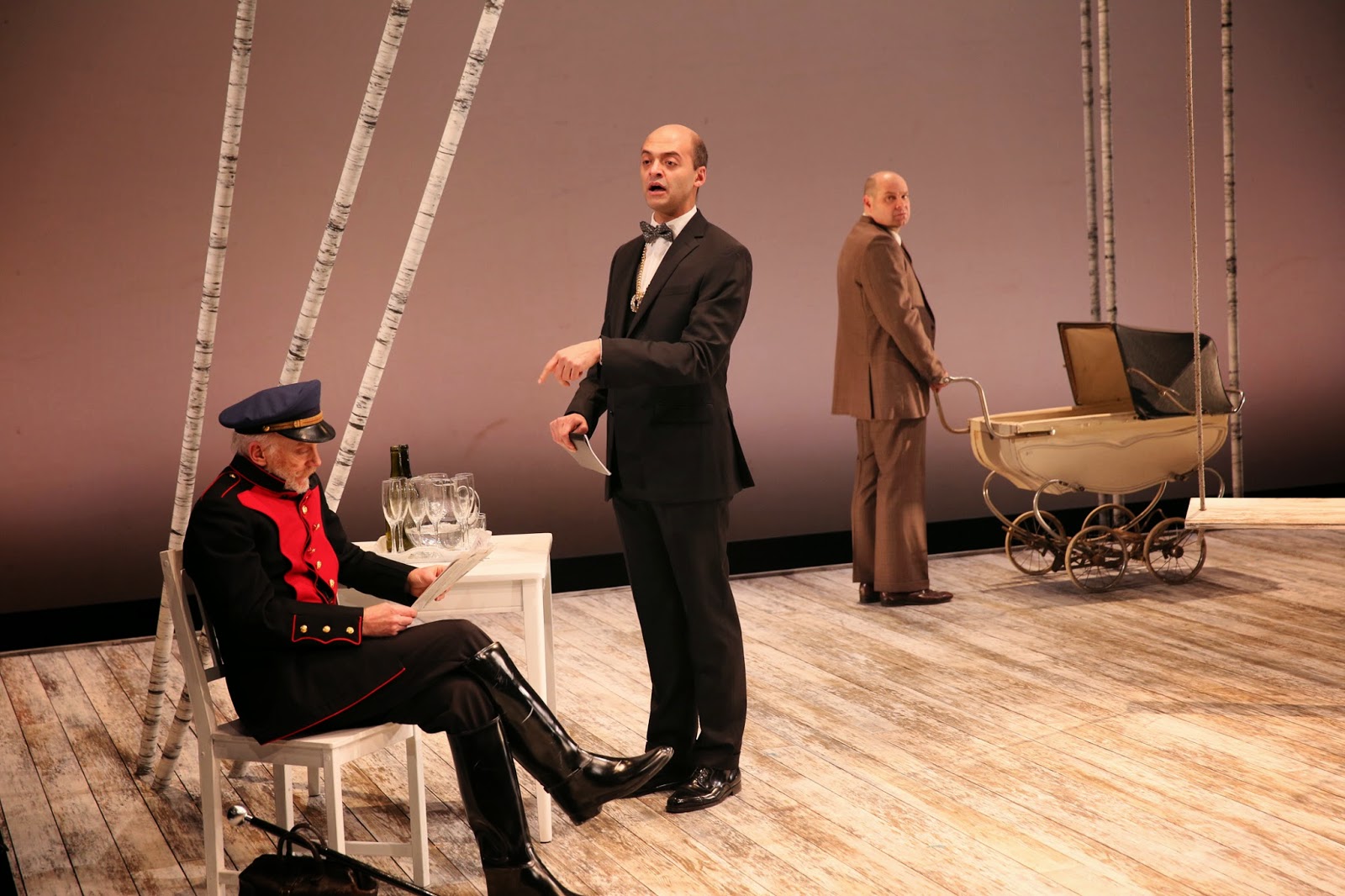+Chris+Bennion.jpg) |
| The Seagull Project — The Three Sisters— photo by Chris Bennion |
Anyone unaware of Russian history during the time when Chekhov wrote The Three Sisters, would benefit from doing some research before attending the play. The script itself offers no historical background, which would have seemed superfluous when it was new, over a century ago. Written in 1900, The Three Sisters first reached the stage in 1901, the same year the Socialist-Revolutionary Party came into being. Today’s audience members looking back over that century will feel a nagging sense of dread, knowing what the characters do not know. Russian society was getting restless. The time had come to face the truths of social injustices and class differences, and by 1917, a terrible upheaval would change their world forever.
%2BChris%2BBennion.jpg) |
| The Seagull Project — The Three Sisters — photo by Chris Bennion |
This is not to say that the story depends on its historical context for meaning. It stands on its own. It is about familial and romantic relationships, dreams and notions compromised, societal restraints placed on women, and other timeless themes. However, under the pen of Chekhov and through the touches of Director John Langs and The Seagull Project Company's Co-Artistic Directors Julie Briskman and Gavin Reub, they take on a particular depth and intimacy. The characters feel like people we’ve known. They annoy, sadden, impress and touch us and often make us laugh.
As the title indicates, the play ponders the lives of the three orphaned adult Prozorov sisters, ages 20, 21, and 28. Although their dead mother is barely mentioned, we are aware that their father had been a brigadier general in the army. When he took command of a garrison in the small provincial town where the story takes places, his refined family was uprooted from an interesting life in Moscow. Eleven years after the move, and one year after their father’s death, the daughters find themselves trapped in a world with little to offer in the way of the type of companionship they desire or hope for a better future.
+Chris+Bennion.jpg) |
| The Seagull Project— The Three Sisters— photo by Chris Benin |
Immature Irina (Sydney Andrews), the youngest, daydreams of returning to Moscow where she will surely find her true love. Masha, a year older and already disillusioned with her marriage to a high school Latin teacher Fyodor (Brandon J. Simmons), a man who appears shallow until we come to see him as deeply loving and lovable. Dressed in black, Masha seems to be mourning for the life she might have had, even while peppering the script with her humor. The eldest, Olga (so well portrayed by Julie Briskman) also teaches school and at the young age of 28 already considers herself a tired, aging spinster. Olga, frets over everyone, including elderly servants, always putting others before herself in her compassionate and loving way, to the point where an observer might beg her to quit sacrificing and seize her own life’s potential.
+Chris+Bennion.jpg) |
| The Seagull Project — The Three Sisters — photo by Chris Bennion |
The three sisters also have a brother they call Andrey, another lost soul who once had ambitions to be a college professor in Moscow but ends up merely working for the County Council as a secretary. His marriage to a lower class woman named Natasha (Hannah Victoria Franklin) who becomes the wicked, domineering mistress of the house, along with his deceptions and betrayals of his sisters, will poison the family and alter its fate.
The limited social life of these four siblings revolves around friendships with the officers from the garrison, including a 60-year-old army doctor and family friend, Ivan Chebutykin (Peter Crook). A former friend of their father, he seems like a humorous uncle, put later reveals his own emotional problems.
+Chris+Bennion.jpg) |
| The Seagull Project — The Three Sisters— photo by Chris Bennion |
The Baron Nikolai Tusenbach (CT Doescher), with his unrequited love for Irina, even though they share some socialist viewpoints, appears pathetic at first but earns our respect and sympathy as time goes on. He is harassed by the Staff Captain Vasily Solyony (Tyler J. Polumsky) who will eventually challenge him to a dual. Lieutenant Aleksandr Vershinin (David Quicksall), a married man with children, impresses Masha with his unending philosophical talk and they begin a love affair that remains secret only for a while.
As glum as all of this sounds, the play has humor and lively exchanges between its colorful characters. It does, however, also have duller moments that require paying close attention, especially when trying to keep all those Russian names straight. The interweaving of many subplots gives strength and interest to a story true of any age. Even the costumes, designed by Doris Black, reflect the timeless nature of this play. Except perhaps for the soldiers’ uniforms, they are not period correct, but rather seem to express the personalities of the characters.The play offers a rich intellectual and emotional experience, but the appreciation of it increases with a few days spent pondering. Think of it as a bottle of wine you open and let "breathe."
+Chris+Bennion.jpg) |
| The Seagull Project — The Three Sisters — photo by Chris Bennion |
There is another thing every person who devotes part of their life to volunteering knows; the best way to forget your own troubles is to be conscious of the troubles of others. At the end of the The Three Sisters, you can rise from your seat, go home, and go to bed knowing the equivalent of the Russian Revolution is not waiting to knock at your own door. At least not yet. And that, my friends, is why we love theater.
Please visit Good Life Northwest on Facebook.

No comments:
Post a Comment